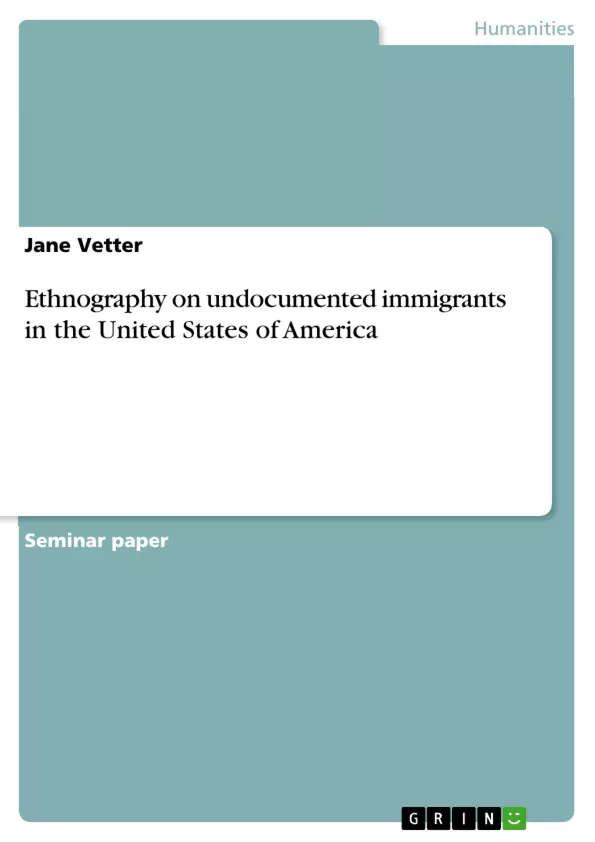Leo Chavez, author of Shadowed Lives – Undocumented Immigrants in American Society and doctor in anthropology, has been working and writing about Central American immigration since 1980 (Chavez, vii). In Shadowed Lives, Chavez described and analyzed lives of illegal Mexican workers in Southern California, using anthropology “for challenging our assumptions about both ourselves and others in our world” (Chavez xii). The author covered, among other things, crossing borders, immigrant homes, migrant problems, families and networks, as well as working structures and processes living as an illegal alien in a foreign country. He was eager to explain phases of separation, transition and incorporation for immigrants when changing social status and environment in order to start a new life and undergo their territorial passage.
The following paper will discuss several topics relating to key concepts learned in class. It will examine emic and etic interpretations, problems of ethnocentrism, and the appliance of cultural relativism. Furthermore, it will highlight research methods and backgrounds with regard to the author and his field of study. Last but not least, the paper will provide several examples of social power and describe factors that impact relationships between individuals or groups.
Inhaltsverzeichnis (Table of Contents)
- Introduction
- Ethnographic Research Methods
- Emic and Etic Perspectives
- Ethnocentrism and Cultural Relativism
- Immigration as a Rite of Passage
- Social Power and Structural Violence
Zielsetzung und Themenschwerpunkte (Objectives and Key Themes)
This paper examines the key concepts learned in an ethnography class using Leo Chavez's Shadowed Lives - Undocumented Immigrants in American Society as a case study. The paper explores emic and etic interpretations, problems of ethnocentrism, and the application of cultural relativism. It also highlights research methods, the author's background, and examples of social power dynamics impacting relationships between individuals and groups.
- Emic and Etic Perspectives on Undocumented Immigration
- The Challenges of Ethnocentrism in Understanding Immigrant Experiences
- Cultural Relativism and Respecting Diverse Cultures
- The Role of Social Power in Shaping the Lives of Undocumented Immigrants
- Structural Violence and its Impact on Immigrant Communities
Zusammenfassung der Kapitel (Chapter Summaries)
- Introduction: The paper introduces Leo Chavez's work on undocumented Mexican immigrants in Southern California, highlighting his use of ethnographic methods to challenge assumptions about both immigrants and U.S. society.
- Ethnographic Research Methods: This section explores the emic and etic perspectives on undocumented immigration, emphasizing the importance of understanding the cultural context of immigrant experiences. It also discusses the challenges of ethnocentrism and the significance of cultural relativism in appreciating diverse cultures.
- Immigration as a Rite of Passage: The paper examines the motivations behind undocumented immigration, emphasizing the complex factors that drive individuals to leave their home countries, including economic hardship and the desire for a better life. It highlights the importance of understanding the meaning of immigration for those involved.
- Social Power and Structural Violence: This section explores the dynamics of social power and structural violence within the context of undocumented immigration. It examines how power imbalances, particularly between employers and workers, can result in exploitation, dangerous working conditions, and a lack of basic rights. The paper highlights the impact of structural violence on immigrant communities, often resulting in suffering and a violation of human rights.
Schlüsselwörter (Keywords)
The key concepts explored in this paper include undocumented immigration, ethnographic methods, emic and etic perspectives, ethnocentrism, cultural relativism, social power, structural violence, and the experiences of Mexican immigrants in the United States. The paper highlights the importance of understanding the complex dynamics of immigration, the impact of cultural differences, and the consequences of social power imbalances on the lives of undocumented immigrants.
Frequently Asked Questions
What is the focus of Leo Chavez's "Shadowed Lives"?
The book describes and analyzes the lives of undocumented Mexican immigrants in Southern California, focusing on border crossing, family networks, and work structures.
What is the difference between emic and etic perspectives?
An emic perspective is the "insider's" view of a culture, while an etic perspective is the "outsider's" or researcher's analytical view.
How does the book apply the concept of "cultural relativism"?
It uses cultural relativism to challenge ethnocentric assumptions and understand immigrant behaviors and choices within their own cultural and economic context.
What is "structural violence" in the context of immigration?
Structural violence refers to the systemic ways social structures or institutions harm people by preventing them from meeting their basic needs, often seen in the exploitation of undocumented workers.
Why does Chavez describe immigration as a "rite of passage"?
He views the process of immigration through the phases of separation, transition, and incorporation as individuals undergo a territorial and social status change to start a new life.
- Arbeit zitieren
- Jane Vetter (Autor:in), 2007, Ethnography on undocumented immigrants in the United States of America, München, GRIN Verlag, https://www.grin.com/document/116459



